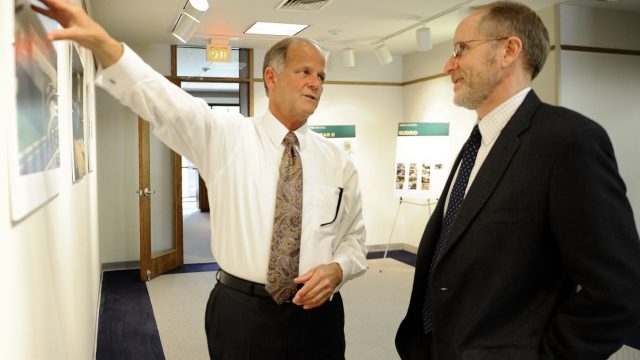Proposed Legislation Would Prohibit University Foundations From Covering Personal Expenses For Presidents

Earlier this year embattled North Dakota State University President Dean Bresciani found himself in hot water after he billed a roughly $7,000 first class ticket upgrade to the taxpayers.
Bresciani’s boss, North Dakota University System Chancellor Mark Hagerott, called it an “embarrassment.” In response, Bresciani asked the NDSU Development Foundation to cover the cost of the ticket upgrade, though he tried to claim that the funds were volunteered.
And it seems that the foundation covers a lot of Bresciani’s expenses. According to records I obtained last month, he was reimbursed by the foundation for over $70,000 worth of expenses from January 1 of 2015 through January 31 of 2016, including over $11,000 for his membership at the Fargo Country Club.
Now a state lawmaker wants to put a stop to it all. Rep. Roscoe Streyle, a Republican from Minot who serves as Vice Chairman of the interim Higher Education Committee, shared with me draft legislation for the upcoming 2017 legislative session which would prohibit university presidents from receiving any sort of compensation or expense reimbursement from the universities:
Streyle is, without question, an outspoken critic of Bresciani and many aspects of higher education, so there may be some temptation to write this off as a vindictive bill. But I think it could address an extremely important concern when it comes to the leadership of the state universities and the supposedly separate, private foundations which support them.
Consider this: We don’t know who the donors are who paid for Bresciani’s first class plane ticket.
I put an open records request to John Glover, the CEO of the NDSU Development Foundation, asking for information pertaining to the identity of these donors. “Your request for records below seeks records that would identify specific donors, and would provide details regarding a gift,” he said in response. “North Dakota Century Code section 44-04-18.15 exempts this information from the open records laws. Therefore, no records will be provided in response to your request.”
He’s right on the law. Those records are exempt, and that’s a problem. I followed up with Glover asking about what protocols they have in place to ensure that the donors paying for Bresciani’s personal expenses are not also in position to get preferential treatment from Bresciani when it comes to business with NDSU.
[mks_pullquote align=”right” width=”300″ size=”24″ bg_color=”#ffffff” txt_color=”#000000″]How do we know that the donors paying for Bresciani’s luxury travel arrangements – not to mention his $11,000 per-year country club membership and the flowers for his office and the booze for his parties – aren’t people who stand to benefit from Bresciani’s actions as the head of NDSU?[/mks_pullquote]
He didn’t bother responding to me.
How do we know that the donors paying for Bresciani’s luxury travel arrangements – not to mention his $11,000 per-year country club membership and the flowers for his office and the booze for his parties – aren’t people who stand to benefit from Bresciani’s actions as the head of NDSU?
For instance, there is a battle over housing development around the NDSU campus. People currently living in those neighborhoods are concerned about it. More then concerned, they’re outright opposed to it. One of the loudest voices in support of the development? NDSU President Dean Bresciani.
Only, is Bresciani speaking on behalf of the university? Or on behalf of the foundation and its donors?
Keep in mind that one of the development projects is being sponsored by the foundation, which lists Bresciani as a trustee, and that the other developers may also be donors to the foundation.
Something we do not and cannot know. Just as we don’t know whether any of the foundation’s donors also have business with the university. Because the donors are a secret, per state law.
The potential for quid pro quo arrangements and conflicts of interest is enormous when we have a private foundation with secret donors paying huge dollars to cover the lavish expenses of a public servant.
I hope that Streyle’s bill starts a real conversation about this issue, because it’s time we had one.





